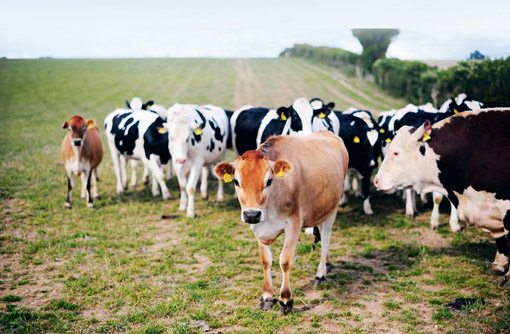Encouraging best practice worm control in cattle

Endoparasites can present different clinical signs, all of which can cause loss in production, decreased fertility and poor growth rates – consequently, prevention is crucial.
However, responsible use of wormers is paramount to ensure long-term sustainability of worm control. Currently, anthelmintic resistance is not considered a severe problem in cattle, but as we have seen in the sheep sector, the incidence of resistance will grow unless we do something about it now.
Anthelmintic resistance describes the situation whereby parasites can tolerate wormer doses that are normally lethal. It becomes an inheritable feature among the worm species and as such becomes a long-term problem in your herd.
We need to look at how we use wormers across the board and ensure we use them only when they are needed. By adopting best practice the more efficient use of anthelmintics will mean not only savings on farm, but also reduce the risk of resistance developing.
Economics show it really is worth taking time to talk to your vet or adviser about developing a suitable worm management policy for your farm.
Faecal egg counts
First of all know your enemy. Using faecal egg counts (FEC) will help establish which worms are involved and at what level. The use of FECs is an ideal means to improve the monitoring and management of the worm issues on your farm.
It is important to choose the right wormer for your specific problem. Use narrow spectrum products where possible. It is essential to avoid “off target” use, such as a combination product.
Make sure you are using the correct dose and administering the drug properly. It’s important to know the weight of your animal in order to calculate the correct dose. Under dosing can lead to real problems as it gives the worms enough chemical for them to evolve and adapt to its presence without being harmed.
Pour-on wormers are particularly easy to under dose as they can be hard to apply correctly. It is crucial you know the correct weight and therefore dosage to give each animal. If in doubt about an individual animal’s weight, dose for the heaviest animal in the herd. But remember, only dose when it’s needed.
Treatment technique
Poor treatment techniques can also lead to treatment failure. Follow the manufactures instructions carefully. Simple things such as the correct storage of the product is needed; if not done correctly the efficacy of the product may be affected. The equipment used must be in good working order so check your kit carefully before dosing cattle.
We will not be able to eliminate all worms so it is important that the population present works in your favour. It is essential to ensure stock is exposed to some worms to ensure they develop adequate immunity for future life. These worms, however, need to be susceptible to anthelmintics.
Ideally you want to present a challenge to the immune system of your youngstock so that the animal can build up resistance naturally. It’s better to manage a small population of the “right”, non-resistant worms on your farm that you can treat if the situation gets worse.
Steps to help avoid and manage anthelmintic resistance on farm
• Work out a control strategy with your vet and advisers.
• Use effective quarantine strategies to prevent the risk of importing resistant worms into your herd. This is also important to help with the control of diseases such as salmonella and Johnes.
• Test for resistance on farm.
• Administer all wormers effectively and according to manufacturer’s instructions.
• Use wormers only when necessary and select the appropriate wormer for your problem.
• Adopt strategies to preserve the susceptible worms on farm – live with the “right” type of worms.
• Reduce dependency on wormers by adopting management strategies such as pasture management.
• Find a strategy that works for your farm and its worm history.
The DairyCo and Eblex Control of Worms Sustainably project has been developed to help ensure more efficient use of wormers on farm and at the same time to reduce the development of anthelmintic resistance.
DairyCo is holding three workshops on the Control of Worms Sustainably with Alan Murphy in Leicestershire and Nottinghamshire in November.
For more information visit www.dairyco.org.uk, where you can also download the DairyCo Control of Worms Sustainably (COWS) booklet.
